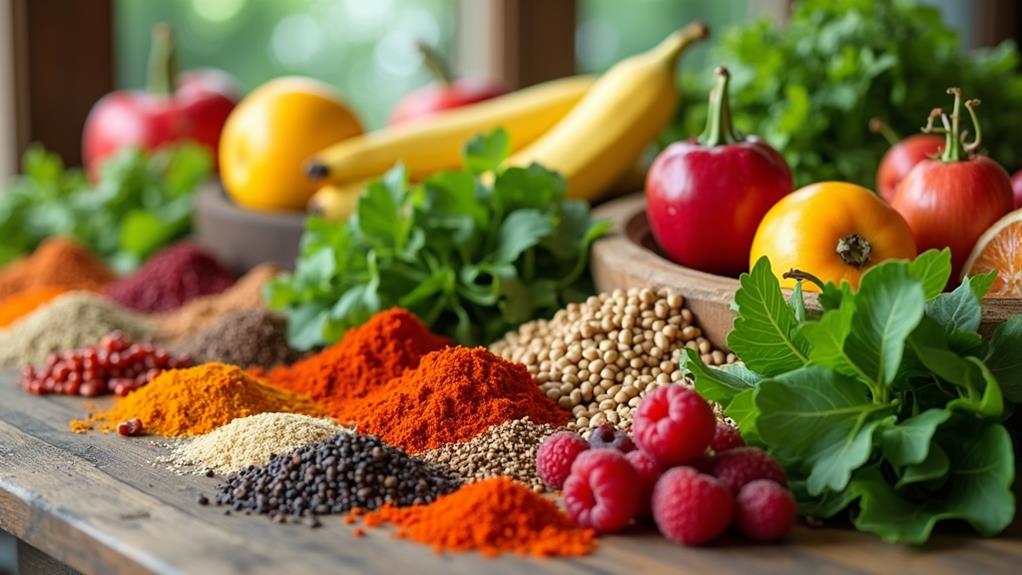You can enhance your overall wellness by incorporating three essential nutrition tips customized for women’s comprehensive health. First, focus on nutrient-dense foods like leafy greens, fatty fish, and calcium-rich options to support bone health and mood. Second, adopt meal prepping to save time, reduce stress, and control portions—this helps you stick to a balanced diet.
Finally, stay hydrated by drinking about 2.7 liters of water daily and incorporating water-rich foods which combat fatigue and improve cognitive function. By following these tips, you’ll strengthen yourself on the path to comprehensive health, and there’s more significant information just ahead.
Key Takeaways
- Focus on nutrient-dense foods like leafy greens, nuts, and fatty fish to enhance overall health and mood regulation.
- Incorporate meal prepping strategies to save time and promote balanced diets filled with essential nutrients.
- Ensure adequate hydration by drinking about 2.7 liters of water daily and consuming water-rich foods like fruits and vegetables.
- Include calcium-rich foods to prevent osteoporosis and iron-rich options to combat deficiency, especially for postmenopausal women.
- Practice mindful eating to improve digestion and maintain a healthy relationship with food, supporting holistic wellness.
Focus on Nutrient-Dense Foods
When it comes to maintaining your health at every stage of life, focusing on nutrient-dense foods is fundamental. These foods, like leafy greens, nuts, and whole grains, provide essential vitamins and minerals that support women’s health, especially during important periods such as pregnancy and menopause. A healthy diet rich in crucial nutrients helps keep your body functioning at its best.
Incorporating omega-3 fatty acids from sources like fatty fish and flaxseeds can greatly enhance your brain function and mood regulation, which are essential for your mental well-being.
Additionally, consuming calcium-rich foods, including dairy products and fortified plant-based alternatives, is important for preventing osteoporosis, particularly in postmenopausal women at risk of bone density loss.
Moreover, it’s important to include iron-rich foods like lean meats, beans, and fortified cereals in your meals to combat iron deficiency anemia, especially during menstruation and pregnancy.
Finally, aim to consume a variety of colorful fruits and vegetables to guarantee you’re getting a wide range of antioxidants and phytonutrients, which can help reduce inflammation and support immune function.
Embracing a comprehensive approach to nutrition enables you to thrive in your health path.
Embrace Meal Prepping Strategies
Start your week off right by embracing meal prepping strategies that can alter your approach to healthy eating. Meal prepping saves time and reduces stress during busy weeks, helping you stick to a balanced diet vital for your comprehensive wellness.
By preparing meals in advance, you’ll avoid the temptation of processed foods, as studies show meal preppers consume fewer added sugars and unhealthy fats.
Incorporating a variety of nutrient-dense foods is essential, especially as women have increased nutritional needs during different life stages, such as menstruation and menopause.
Batch cooking techniques not only promote portion control but also aid in weight management, helping prevent mood swings linked to blood sugar fluctuations.
To enhance your meal prepping experience, invest in proper storage containers. This allows you to easily label and organize your meals, promoting consistency in your healthy eating habits throughout the week.
Embracing meal prepping not only supports your physical health but also contributes to your emotional well-being by reducing the stress of last-minute meal decisions.
Start today, and watch how these strategies reshape your relationship with food and wellness.
Stay Hydrated and Mindful

After meal prepping your nutritious dishes, it’s time to focus on another vital aspect of wellness: hydration. Staying hydrated is essential for your physical health and mental well-being. The recommended daily water intake for women is about 2.7 liters, which supports digestion, nutrient absorption, and skin health.
Mindful drinking can help you achieve this goal. By paying attention to your hydration cues and opting for water or herbal teas over sugary beverages, you can prevent mood fluctuations and promote overall wellness. Dehydration can lead to fatigue, headaches, and reduced cognitive function, so incorporating water-rich foods like fruits and vegetables into your diet is beneficial too.
Practice mindfulness while drinking—savor each sip and acknowledge the sensations of hydration. This approach enhances your experience and nurtures a deeper appreciation for your body’s needs.
Keeping a water bottle handy and setting prompts throughout the day can encourage regular hydration. By prioritizing hydration in your daily routine, you support your whole person wellness, contributing to better physical and mental health outcomes.
Keep in mind, every sip counts toward a healthier you!
Conclusion
By focusing on nutrient-dense foods, embracing meal prepping, and staying hydrated, you’re laying the groundwork for comprehensive wellness in your life. Remember, you are what you eat, so choose wisely and treat your body with the care it deserves. Incorporating these strategies will not only enhance your physical health but also support your mental and emotional well-being. With a little effort and intention, you can truly thrive and feel your best every day.
Join our list
Subscribe to our mailing list and get interesting stuff and updates to your email inbox.

